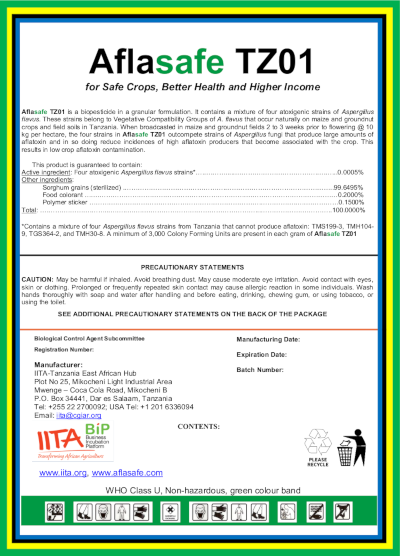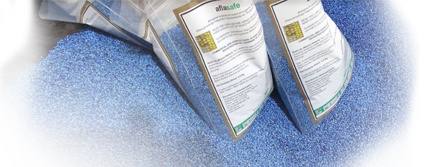Arusha, Tanzania, 07 May 2019 – Today marks an important milestone in Tanzania’s fight against deadly aflatoxin contamination in the country’s key foods – groundnuts and maize. A Technology Transfer and Licensing Agreement (TTLA) was signed to enable local production and distribution of Aflasafe TZ01 – an all-natural environmentally friendly product specially tailored for Tanzania to stem aflatoxin contamination in groundnuts and maize, both key staples on Tanzanian tables.

This landmark TTLA is between the International Institute of Tropical Agriculture (IITA) and A to Z Textile Mills Limited. A to Z is a private company operating across Tanzania, focussing on providing innovative agricultural solutions through their established AgroZ® range of products, whose latest addition will be Aflasafe TZ01. Aflasafe will join the pre-existing portfolio of A to Z’s health products, which already includes other solutions for mitigating aflatoxin such as AgroZ® hermetic bags and tarpaulins. “We plan to have Aflasafe TZ01 in the hands of Tanzania’s farmers in time for the next sowing season in November this year, to help manage aflatoxin,” revealed Mr Kalpesh Shah, A to Z CEO.
Among the risks associated with consumption of aflatoxin-contaminated maize and groundnuts are weakened immunity, child stunting and malnutrition, liver cancer and death. Various studies indicated between a quarter and nearly half (25–45%) of Tanzania’s maize is aflatoxin-contaminated. Groundnuts too are on average highly contaminated. In 2016, the unfortunate aflatoxin-related deaths in Dodoma called attention to the hidden impact of aflatoxin on consumers: tragically, 19 people lost their lives, with 68 hospitalised.
These tragedies can be prevented. “Aflasafe is a safe, environmentally friendly, scientifically proven product to minimise aflatoxin contamination to ensure aflatoxin-safe food for consumers,” affirmed Dr Amos Namanga Ngongi, Chair of IITA’s Board of Trustees. It has been a collaborative effort, with the Tanzania government involved every step of the way. “Aflasafe TZ01 was developed in partnership with Tanzania’s Ministry of Agriculture, with funding and technical support from USAID–Tanzania through the United States Department of Agriculture – Foreign Agricultural Service,” Dr Namanga Ngongi further clarified.
Behind the product is a biblical epic seven years of local labour for this 100% made-in-Tanzania product. In addition to substantive local participation, Aflasafe TZ01 is grounded on solid science. Product development began with a country-wide survey in 2012 to identify harmless types of Aspergillus flavus – the naturally occurring fungus that is both cause and cure for aflatoxin in food, and from which Aflasafe is itself made. From this exhaustive search, eight friendly fungi types were selected to constitute the Aflasafe specially tailored for Tanzania.
This was followed by testing in real-life conditions in farmer-managed fields in 2016/2017: 402 trials were conducted in four regions (Dodoma, Morongoro, Manyara and Mtwara). For maize, this spanned eight districts (Chamwino, Chemba, Kibaigwa, Kilombero, Kilosa, Kiteto, Kondoa and Kongwa), while tests for groundnuts were in four districts (Kongwa, Masasi, Mpwapwa and Nanyumbu).
The results? A dramatic decrease in aflatoxin, upwards of 85% in the two years that Aflasafe was tested in the real world on farmers’ fields, with Aflasafe applied by the farmers, who also managed the accompanying requisite good agricultural practices to stem aflatoxin.
With these good results, in November 2017, a request for Aflasafe’s registration was made to Tanzania’s National Plant Protection Advisory Committee (NPPAC). This was successful, and Aflasafe was registered in October 2018 by the Registrar of Pesticides. Tanzania is one of the countries where IITA has made the fastest progress in technology transfer, all thanks to the Government of Tanzania.
With the government having paved and eased the way in terms of statutory and regulatory requirements, of note is another critical partner for the next stage: commercialisation. IITA clearly acknowledges the unique expertise and role of the private sector in expanding production and broadening the distribution of Aflasafe to efficiently and rapidly reach farmers in all corners of Tanzania. To assure broad and effective Aflasafe distribution, the business-to-business performance-based agreement signed today spells out annual production and distribution targets to be met. This means that while the TTLA grants A to Z five-year exclusivity, it is conditional on A to Z meeting firm annual targets and requires sustained effective product distribution to farmers.
“We are confident that we will meet the target. In fact, Aflasafe will benefit from A to Z’s extensive distribution network for our agricultural products. Our network comprises more than 200 agro-dealers throughout the country,’’ observed Mr Julius Nyabicha, A to Z’s Marketing Manager for agricultural products.
This good news in Tanzania is part of a wider pan-African effort by IITA and partners. In 2013, IITA took an unusual bold and decisive step, creating a Business Incubation platform (BIP). BIP is a special purpose vehicle to accelerate the uptake of innovations by proactively forging and strengthening working (as opposed to paper) partnerships with the private sector, and thus serve as a functional bridge between IITA and the private sector in a mutually beneficial manner. IITA needs its technologies to reach the farmers it exists to serve, and the private sector welcomes market-ready post-R&D products where IITA has already invested in product development and statutory registration.
“BIP translates relevant findings from research into commercially viable products to serve as a better mechanism for technology transfer from advanced agricultural research to the private sector,” clarified Dr Kenton Dashiell, IITA’s Deputy Director General, Partnerships for Delivery, “For Tanzania, the result is here for us all to see and bear witness today.”
IITA goes a step further, providing business-development and technical assistance to A to Z. Facilitated by the Aflasafe Technology Transfer and Commercialisation initiative (ATTC), IITA has conducted extensive studies on Aflasafe TZ01 market demand, feasibility, profitability of manufacturing and distribution, identifying potential partners, as well as defining distribution channels and the support required to stimulate use of Aflasafe: all prerequisites for successful commercialisation.
Tanzania is the fourth country to which IITA has transferred Aflasafe products and technology. Other countries are The Gambia, Nigeria and Senegal.
About IITA: The International Institute of Tropical Agriculture (IITA) is a not-for-profit institution that generates agricultural innovations to meet Africa’s most pressing challenges of hunger, malnutrition, poverty and natural resource degradation. Working with various partners across sub-Saharan Africa, we improve livelihoods, enhance food and nutrition security, increase employment, and preserve natural resource integrity. IITA is a member of CGIAR, a global agriculture research partnership for a food-secure future.
About A to Z Textile Mills Ltd: A to Z is a successful family-owned business established in the 1960s. Following a series of diversification drives, A to Z now specialises in vector-control products (primarily long-lasting insecticide-treated mosquito nets); garments and other textiles; packaging materials, including bags for agricultural commodities and cement; and household plastic items and products for use in agriculture, such as on-farm hermetic storage solutions that include AgroZ® Bag, AgroZ® Bag Plus and maize-drying mats (AgroZ® tarpaulins).
Contacts, and more information:
- Media: Njeri Okono, Communications Specialist, Aflasafe Technology Transfer and Commercialisation initiative (ATTC)
- Where to buy Aflasafe in Tanzania / A to Z: Julius Nyabichi, Marketing Manager for agricultural products
- Aflasafe TZ01 product R&D in Tanzania: George Mahuku, Senior Plant Pathologist, IITA
Aflasafe website | Aflasafe in Tanzania | Aflatoxin
Aflasafe TZ01 label front | back










